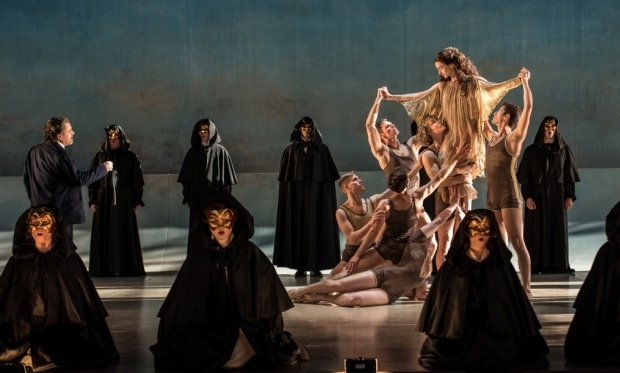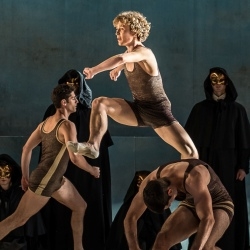Death in Venice (Garsington Opera at Wormsley)
A thrilling, unwavering new production of Britten’s final opera

© Clive Barda
Paul Curran's new staging of Britten's final and most personal opera dares more. It's dominated jointly by Paul Nilon's prodigious performance as Aschenbach, the cerebral writer who goes to Venice to seek spiritual renewal, and by the 19-year-old French dancer who plays Tadzio. Célestin Boutin is a radiant presence who fits the job description to a T-shirt, and Andreas Heise's elemental choreography celebrates his beauty from first to last without a hint of demur.
Boutin's Tadzio is feeling his oats. He even tries it on with his young Governess (Georgie Rose Connolly), which goes some way to explain his detachment from the haughty Polish family and turns him into a sexually ambiguous figure. But, fascinatingly, Curran also makes him semi-divine: he becomes an idea as much as a human being, haunting Aschenbach's dreams and unlocking his dormant libido. And it is this that leads, inevitably, to the production's brilliant and indelible final image.
'An unforgettable Aschenbach'
Among what seem like a hundred bite-size comprimario characters there are no weak links, while at the head of this rare ensemble the baritone William Dazeley carves a lizardly presence in his multiple roles as the tempter figure. Even-toned and insidious, he's not a million miles from John Shirley-Quirk in the original production, but with greater physicality.
That premiere happened 42 years ago, when Britten was too ill to conduct it himself so handed the reins to his protégé. The composer was good at choosing those, and over the ensuing decades Steuart Bedford has shown his class time and again while remaining one of Britain's unsung musical heroes. Now in his late seventies, he has returned to Death in Venice and coaxes a searing reading of this intricate score from Garsington Opera's magnificent orchestra. He captures every speck of the sensuous beauty, unfulfilled yearning and suppressed carnality that ripple through Britten's percussive sound world.

© Clive Barda
There are niggles in the staging (too much reliance on designer Kevin Knight's recalcitrant quartet of white curtains), choreography (an aesthetic that jumps jarringly from ballet to tumbling to mime, with unstylised realism in repose) and costumes (young men on the beach in tops and trunks from a knitwear catalogue), but the blips are as nothing when set against Curran's piercing vision.
Act two is extraordinary: he fills the sexual gaps that Britten and his librettist, Myfanwy Piper, coyly obfuscate through high discourse, so that when countertenor Tom Verney's god Apollo is banished along with his exortation to "love reason, beauty, form" he leaves behind not the 'abyss' (Piper's self-denying word) but a spirit of freedom and rapture. It's a moment that's staged by Curran and Heise to be explicit but never prurient.
Curran's direction is full of felicities. Some, like the strawberry seller's obvious illness, are tiny; others, like the Greco-Venetian chorus of masked voices during the Games of Apollo, substantial inspirations. But at heart this is Paul Nilon's triumph. He may favour smooth singing over characterised narration in the early recitatives — wrongly, to my mind — but he is nevertheless an unforgettable Aschenbach: an initially vulnerable figure who becomes the wreckage of a man, clinging desperately to his ebbing life even as he wishes it away.












